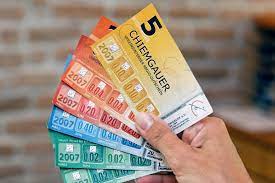 Local currencies are currencies that circulate mostly locally and at a community level. They work as complementary to an official, legal currency. They are usually accepted by local traders of all kinds, and they give local residents an incentive to shop locally.
Local currencies are currencies that circulate mostly locally and at a community level. They work as complementary to an official, legal currency. They are usually accepted by local traders of all kinds, and they give local residents an incentive to shop locally.
As a result, local currencies help a particular community or region strengthen and decarbonize its local economy. They help build community spirit while reducing people’s carbon footprint and improve local resilience.
Local currencies aim to operate alongside the official currency of a place. They are not legal tender, so no one has to accept them in exchange for goods or services if they haven’t agreed to be part of the currency’s trader network.
So while Euros, Sterlings, or Pounds will always be needed for national and international trade, it becomes possible to promote local trade and strengthen the local economy using a local (complementary) currency.
Ultimately, local currencies are usually complementary currencies that become part of a domestic currency to help achieve a certain goal, like strengthening the local economy or reducing greenhouse gas emissions.
Read more and see case studies:
https://youmatter.world/en/what-are-local-currencies-examples/
Local money – how to make it happen in your community BOOK